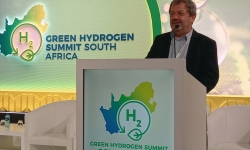CSIR scientists help shape the path towards a green hydrogen economy at the second South African Green Hydrogen Summit
A team of CSIR scientists contributed to showcasing the potential of renewable energy production and green hydrogen priorities during the second South African Green Hydrogen Summit (SAGHS) 2023, held from 15 to 17 October 2023 in Cape Town.

A team of CSIR scientists contributed to showcasing the potential of renewable energy production and green hydrogen priorities during the second South African Green Hydrogen Summit (SAGHS) 2023, held from 15 to 17 October 2023 in Cape Town.
The complexity of green hydrogen and developing a successful green hydrogen economy is anticipated to require a sophisticated combination of scientific and engineering innovation and capability, political support, international investment and enabling legislative reform. Joining the discussions and deliberations on the matter, were CSIR experts Thomas Roos, Luanita Snyman-Van der Walt and Paul Lochner. The trio offered their expertise during talks and panel discussions.
Annual gatherings like the SAGHS 2023 create platforms for meaningful engagement, also about the multidisciplinary research work being done at the CSIR.
Roos shared insights on major trends in maritime transport and the opportunities for hydrogen, including the South African ports’ roles as hubs of a global PtX (renewable energies) economy. Snyman-Van der Walt presented a spatial atlas of South Africa’s green hydrogen export potential. The atlas aims to provide a balanced view of key technical, environmental, social and safety considerations to guide early green hydrogen development planning. The atlas will be made available as an open interactive webmap.
Lochner participated in a panel session that drew attention to the topic of infrastructure readiness for green hydrogen in South Africa. Here, the emphasis was on the planning and readiness of enabling built infrastructure such as pipelines, trucks and railways. Lochner detailed the environmental planning that has been undertaken in South Africa for the development of a gas pipeline network as part of a strategic environmental assessment conducted by the CSIR for the Department of Forestry, Fisheries and the Environment and other government departments and entities. The assessment was completed in 2019 and the outcomes – gas pipeline corridors – became legislation in 2021 and serve as an example of how innovation and research can be operationalised as policy and decision-making processes, also to facilitate a green hydrogen economy’s role in the country’s development.
The summit is hosted by the Presidency of South Africa and welcomes local and global leaders, investors, researchers and industry in the green hydrogen space. Consequently, the opening addresses were delivered by President Cyril Ramaphosa; the Minister of Electricity, Dr Kgosientsho Ramokgopa; and the Premier of the Western Cape, Alan Winde. They emphasised the need to shift from the use and reliance on fossil fuels towards an economy in which the contribution of green hydrogen can be realised. This is to limit damage experienced by the impacts of climate change. The potential for developing a green hydrogen economy in South Africa, Namibia and more widely in Africa also received considerate deliberation.
In sharing his key findings as a participant at this year’s summit, Lochner says, “There is tremendous potential for South Africa to develop a green hydrogen economy. For this to actualise, collaboration among the public and private sector will be absolutely crucial.” Snyman-Van der Walt added, “It is fantastic to see the progress made in the industry since last year’s summit – we are moving from early discussions and concepts towards developing practicable planning and policy tools to support the responsible roll-out of a South African green hydrogen economy.”



